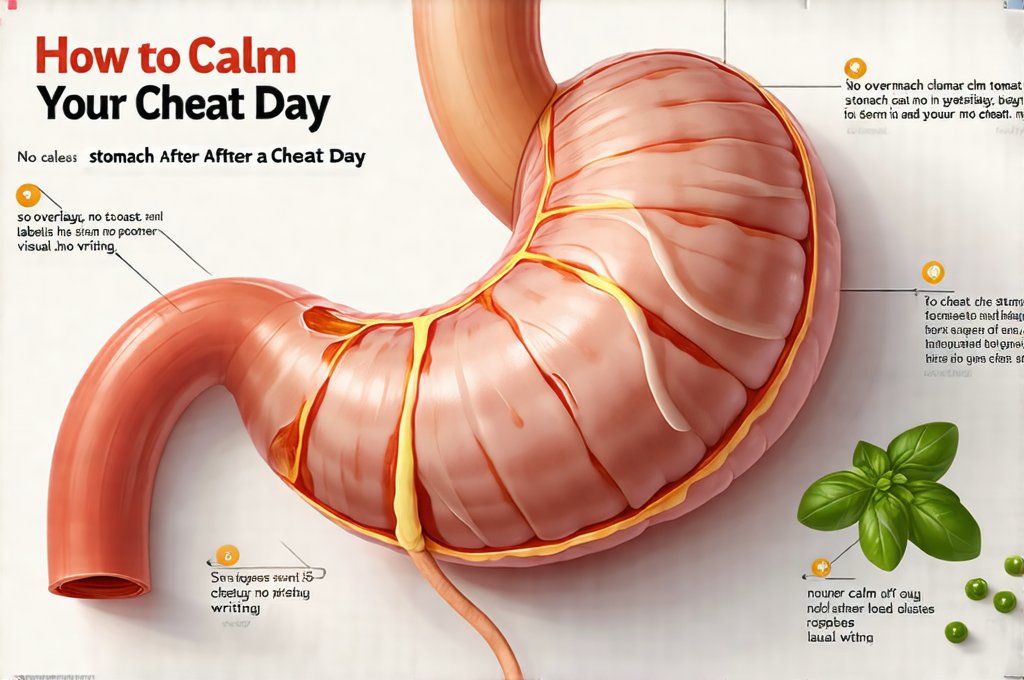Cheat days are often framed as necessary evils in the world of mindful eating—a planned respite from strict dietary rules that can prevent feelings of deprivation and promote long-term adherence to healthy habits. However, even a well-intentioned cheat day can sometimes leave you feeling physically uncomfortable, with symptoms ranging from mild bloating and indigestion to more pronounced stomach upset. This isn’t necessarily a sign of failure; it’s often simply your digestive system reacting to a sudden shift in dietary intake—a change in volume, fat content, sugar levels, or even food combinations that it’s not accustomed to processing regularly. Understanding why this happens is the first step toward effectively soothing your stomach and getting back on track.
The discomfort following a cheat day isn’t always about willpower or guilt; it’s often physiological. When we consistently adhere to a specific diet, our gut microbiome adapts to efficiently process those foods. A sudden influx of different nutrients—particularly from highly processed or rich foods—can disrupt this balance, leading to temporary digestive distress. The body may struggle with the increased workload, resulting in gas, bloating, heartburn, and even nausea. Recognizing that these symptoms are often a normal response to dietary changes can alleviate anxiety and empower you to take proactive steps towards recovery. It’s about recognizing your body’s signals and responding with kindness and appropriate care rather than self-criticism. If you have struggled with symptoms for years, consider rebuild trust in your body.
Rehydrating & Replenishing Electrolytes
A significant component of post-cheat day stomach discomfort stems from the imbalance created by increased sodium, sugar, and potentially alcohol consumption (depending on the “cheat”). Many indulgent foods are naturally higher in sodium, which can lead to water retention and bloating. Sugary treats cause osmotic shifts within the digestive system, drawing water into the intestines and contributing to diarrhea or constipation. Alcohol further dehydrates the body and interferes with nutrient absorption. Therefore, rehydration is paramount. Don’t just reach for any beverage; strategic rehydration is key.
Water should be your primary focus – aim for a consistent intake throughout the day after your cheat day. However, supplementing with electrolyte-rich fluids can significantly expedite recovery. Plain water helps, but it doesn’t replace the electrolytes lost through increased urination or digestive upset. Good options include:
– Coconut water (naturally contains potassium and sodium)
– Electrolyte tablets or powders dissolved in water
– Diluted fruit juice (in moderation, due to sugar content)
– Herbal teas (ginger and peppermint are particularly soothing – more on that later)
Avoid carbonated beverages initially, as they can exacerbate bloating. Focus instead on sipping small amounts of fluid frequently throughout the day rather than gulping large quantities at once. This allows your body to absorb the fluids more efficiently and minimizes digestive stress. Remember that adequate hydration supports overall digestive function and helps restore balance within your system. If you’re unsure about food safety, learn when a food is no longer safe to consume.
Gentle Digestive Support
Beyond rehydration, providing gentle support to your digestive system is crucial for minimizing discomfort and restoring normalcy. The goal isn’t to aggressively “flush” or detoxify; it’s about easing the workload and allowing your gut to recover at its own pace. This often means temporarily adopting a bland diet that prioritizes easily digestible foods. Think of it as giving your digestive system a vacation from complex processing. Avoid high-fat, highly processed, spicy, or acidic foods for at least 24-48 hours following your cheat day.
Focus on incorporating foods that are known to soothe the stomach and promote healthy digestion. These include:
– Bananas (rich in potassium and gentle on the stomach)
– Rice (easily digestible carbohydrate source)
– Applesauce (provides pectin, a fiber that can help regulate bowel movements)
– Toast (plain or with a small amount of natural peanut butter)
– Steamed vegetables (low-fiber options like carrots and green beans are preferable initially)
Consider incorporating probiotic-rich foods into your diet. Probiotics—beneficial bacteria found in fermented foods like yogurt (if tolerated), kefir, and sauerkraut—can help restore the balance of your gut microbiome. However, if you experience significant bloating or diarrhea, introduce probiotics cautiously, as they can sometimes exacerbate symptoms temporarily. Ultimately, prioritizing gentle nourishment allows your digestive system to recover without being overwhelmed by further stress. It may be helpful to rebuild your microbiome after dietary changes.
Soothing Herbal Remedies
Herbal remedies have long been used to alleviate digestive discomfort, and several options can provide relief after a cheat day. However, it’s vital to approach these with caution and listen to your body’s response. Ginger is renowned for its anti-inflammatory properties and ability to ease nausea. You can consume ginger in various forms:
– Ginger tea (made from fresh ginger slices)
– Ginger chews or candies
– Grated fresh ginger added to food
Peppermint also possesses soothing qualities, particularly for bloating and gas. Peppermint tea is a classic remedy, but peppermint oil capsules (enteric-coated are best) can offer more targeted relief. However, individuals with GERD (gastroesophageal reflux disease) should use peppermint cautiously, as it can sometimes worsen heartburn. Chamomile tea is another excellent option for calming the digestive system and reducing stress, which can indirectly contribute to stomach upset. If you find yourself needing to prep for a test, remember bowel preparation is key.
It’s crucial to note that herbal remedies are not a substitute for medical attention. If your symptoms are severe or persistent, consult with a healthcare professional. Furthermore, be mindful of potential interactions between herbal remedies and any medications you may be taking. Always prioritize safe and informed self-care practices.
Mindful Movement & Rest
While it might seem counterintuitive when feeling unwell, gentle movement can actually aid digestion and alleviate bloating. Avoid strenuous exercise immediately after a cheat day; instead, opt for light activities like walking, yoga, or stretching. These movements help stimulate the digestive system without putting excessive strain on your body. Walking, even a short stroll, encourages peristalsis—the wave-like muscle contractions that move food through the digestive tract.
Equally important is rest. Your body needs time to recover and repair after processing an unusual amount of food. Prioritize getting adequate sleep – aim for 7-8 hours per night – as this allows your body to focus on healing and restoration. Stress can exacerbate digestive issues, so incorporate relaxation techniques into your routine, such as deep breathing exercises, meditation, or spending time in nature. Remember that self-care isn’t a luxury; it’s an essential component of post-cheat day recovery. Learning how to train your gut can also help with tolerance.
Portion Control & Future Planning
Perhaps the most valuable takeaway from a post-cheat day experience is the opportunity to refine your approach to indulgence and mindful eating. While cheat days are acceptable, consider whether “cheating” needs to be so drastic. Often, allowing yourself small indulgences within your overall healthy eating plan can minimize digestive distress and prevent feelings of guilt or deprivation. Focus on portion control during future cheat meals – savor the flavors but avoid overeating.
Furthermore, proactively planning your cheat days can help mitigate discomfort. Choose one day per week (or less frequently) for planned indulgence, and consider what you’ll “cheat” with beforehand. This allows you to mentally prepare and potentially choose options that are slightly easier on your digestive system. It’s not about deprivation; it’s about finding a balance between enjoying life’s pleasures and prioritizing your well-being. Ultimately, learning from your body’s responses to different foods and adjusting your habits accordingly is key to long-term success and a healthy relationship with food. If you are facing a major health event, remember how to plan for the future. You can also test for sensitivities without a lab, if needed.


















